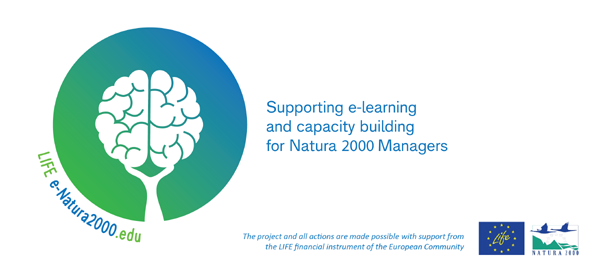e-Natura2000.edu
Acronimo: e-Natura2000.edu
Titolo: Supporting e-learning and open education for Natura 2000 managers
Bando: LIFE
Durata: 01/04/2018 - 31/07/2021 (40 mesi)
Coordinatore: EUROPARC
Budget totale EU: € 845.139,00
Budget TESAF: € 41.627,00
Responsabile scientifico: Tommaso Sitzia
Team: Thomas Campagnaro, Monica Barzon
Riassunto: The project will explore the potential of building new approaches and methods to improve knowledge and capacity amongst Natura 2000 site managers in both public and private land, across the EU. New ways of accessing information, learning and connecting to peers needs to be made available and the cost and the environmental sustainability of traditional training should be addressed. The project will look at both the knowledge and skills required (what a manager needs to know and be able to do) and will tackle, as far as possible within this project, methods that can influence the attitude of staff/persons involved in Natura 2000 management, thus promoting a competence based approach
First, the project will examine the competencies needed by a range of actors to manage Natura 2000 sites more effectively. Then, fundamentally, the preparatory action gives the opportunity to test innovative tools and ways of delivering capacity building for those involved in the management of N2000 sites. A sample cohort of participants would be selected, to receive and test the tools, providing representative examples of the issues facing Natura 2000 site managers in different Member States.
The project will also build on the experience of a range of existing EU and national communication initiatives, via the networks of the project partners, in order to reach the widest possible audience and the opportunity to make use of new technology for accessible capacity building learning experiences.
A focus would be put on developing tools that could be rolled out to reach the widest possible audience. These tools will make use of innovative approaches, including blended learning, using digital technologies and media. . In addition, the project team trainers will create more accessible experience exchange events through a virtual twinning hub with additional summer schools to establish a wider peer-to-peer learning initiative.
The project team stresses however, that learning face-to-face (f2f) and in the field is important to engage managers,. This blended learning will be the feature of the modules that will be tested though the project.
This is particularly true with effective Natura 2000 site management, which implies a field knowledge of ecosystem components and functions. Not all content is suitable for e-learning Careful consideration of these aspects will be given throughout the project.
Main project objectives:
- to develop a targeted set of mechanisms for competences gap analysis, such as a training needs analysis tool, and Natura 2000 capacity building framework amongst public and private Natura 2000 site managers across the European Union territory.
- to deliver a new and innovative and relevant toolbox of learning experiences, designed for the needs of all involved in N2000 management combining digital technology, media and some traditional education methods (f2f workshops).
- to improve their capacities and competencies enabling Natura 2000 sites managers to feel confident and capable in implementing the Nature Directives in their locale, which will in turn, improve effectiveness in the management Natura 2000 sites.
Partners:
- EUROPARC Federation (lead Partner)
- ProPark
- FUNGOBE / EUROPARC Spain
- TESAF Department of the University of Padova
- European Landowners Organisation
- Kullaberg Nature Reserve

Sito Web: https://www.europarc.org/tools-and-training/life-e-natura2000-edu
Virtual Summer School
"Natura 2000 in Practice"
Brief description: An online summer school focusing on the management and planning of Natura 2000 sites, and how to apply innovative tools to meet the requirements of the Habitats Directive and Birds Directive acting on Natura 2000 sites. The final aim was to train public and private staff involved in the management of Natura 2000 sites. The activities had an interdisciplinary approach, during which active online participation was favoured through specific moments for discussion. A specific focus was given to assessing conservation status and degree, identifying indicators of conservation conditions, applying monitoring protocols, and communicating and making aware stakeholders and the general public.
Lecturers/Trainers: Tommaso Sitzia, Thomas Campagnaro, Simone Iacopino (University of Padova), Neil McIntosh (EUROPARC), Douglas Evans (environmental consultant, retired from the European Topic Centre on Biological Diversity), Clive Hurford (researcher on the Living Wales project team at Aberystwyth University), Diego García Ventura (Fernando González Bernáldez Foundation - FUNGOBE), Alina Ionita (for ProPark - Foundation for Protected Areas), Riccardo Da Re, Giacomo Laghetto (ETIFOR), Vito Emanuele Cambria (Sapienza, University of Rome).
Dates: 7-17 June 2021
The online tools: The Moodle platform was used to store information and to interact with participants. Zoom was used for live online sessions while videos were posted together with other material such as web links and documents. Virtual field visits consist in ad-hoc videos on monitoring and restoration practices.






